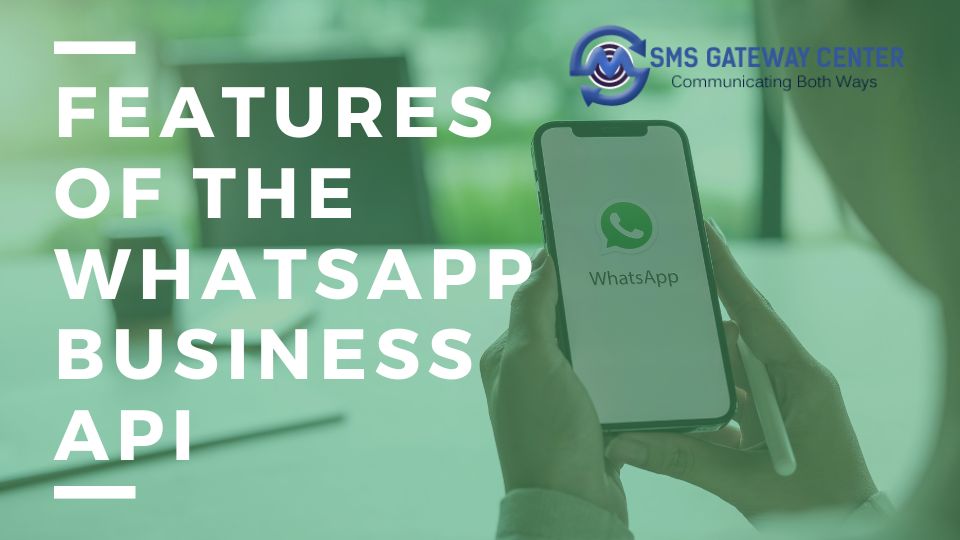Features of the WhatsApp Business API
The WhatsApp Business API is a powerful tool for businesses looking to improve customer engagement and drive growth. With over 2 billion active users worldwide, WhatsApp is a popular messaging app that offers businesses the opportunity to connect with customers in a more personal and engaging way. In this article, we’ll explore the key features of the WhatsApp Business API and how businesses can use them to improve customer engagement and drive growth.

Two-Way Communication
One of the key features of the WhatsApp Business API is the ability to enable two-way communication between businesses and customers. This means that customers can send messages to businesses and businesses can respond in a timely manner. Enabling two-way communication can help businesses build stronger relationships with customers by providing a more personalized experience.
To enable two-way communication, businesses can use chatbots to handle customer inquiries and automate responses. Chatbots can be programmed to respond to common customer questions and provide helpful information. Additionally, chatbots can be used to collect customer feedback and provide personalized recommendations based on customer behaviour.
Another advantage of the WhatsApp Business API is the ability to use rich media such as images, videos, and audio messages. Rich media can help businesses create more engaging and visually appealing messaging campaigns. For example, businesses can use images to showcase their products or use videos to provide tutorials on how to use their products.
Rich Media Messaging
To use rich media effectively, businesses should ensure that their media is optimized for mobile devices. This means using high-quality images and videos that load quickly and are easy to view on a small screen.
Automated Messaging
The WhatsApp Business API also offers businesses the ability to automate messaging campaigns. Businesses can use pre-approved message templates for common types of customer communication, such as appointment reminders and shipping updates. Additionally, businesses can use chatbots to handle customer inquiries and provide 24/7 support.
Automated messaging can help businesses save time and improve efficiency by automating repetitive tasks. Additionally, automated messaging can help businesses provide a more consistent customer experience by ensuring that messages are sent in a timely manner.
Personalized Messaging
Personalization is key to creating a more engaging customer experience. By using customer data such as purchase history, browsing behaviour, and location, businesses can create personalized messaging campaigns that are tailored to the individual customer.
For example, a business could send a personalized message to a customer who has abandoned their cart on their website, reminding them of the products they left behind and offering a discount code to incentivize them to complete their purchase.
Targeted Messaging
Sending targeted messages to specific customer segments can help businesses improve the effectiveness of their messaging campaigns. By using customer data such as demographic information and purchase behaviour, businesses can create targeted messaging campaigns that are more relevant to the recipient.
For example, a business could send a targeted message to customers who have purchased a specific product, offering a complementary product or service that is relevant to their interests.
WhatsApp Business API Analytics
To measure the effectiveness of messaging campaigns, businesses should use WhatsApp Business API analytics. WhatsApp Business API analytics provide valuable insights into message delivery rate, open rate, response rate, and conversion rate.
By analysing these metrics, businesses can gain a better understanding of the effectiveness of their messaging campaigns and make data-driven decisions to optimize their messaging strategies.
Messaging Compliance
WhatsApp has strict guidelines for messaging compliance to protect customer privacy and prevent spam. Businesses should ensure that their messaging campaigns comply with these guidelines to avoid penalties or account suspension.
To ensure messaging compliance, businesses should use pre-approved message templates for common types of customer communication such as appointment reminders and shipping updates. Additionally, businesses should provide customers with the option to opt-out of messaging campaigns and should only send messages to customers who have provided their consent.
WhatsApp Business API Integration
The WhatsApp Business API can be integrated with other business systems
such as CRM and marketing automation platforms. This integration can help businesses improve the efficiency of their messaging campaigns by automating the process of syncing customer data between systems.
For example, if a customer makes a purchase on a website, their information can be automatically synced with the CRM system and used to send targeted messaging campaigns.
In conclusion, the WhatsApp Business API offers a range of powerful features that businesses can use to improve customer engagement and drive growth. From two-way communication and rich media messaging to personalized and targeted messaging campaigns, the WhatsApp Business API provides businesses with the tools they need to create a more engaging and personalized customer experience.
To make the most of the WhatsApp Business API, businesses should ensure that their messaging campaigns comply with WhatsApp’s messaging guidelines (check our pricing) and use analytics to measure the effectiveness of their campaigns. Additionally, businesses should consider integrating the WhatsApp Business API with other business systems to improve efficiency and automation.
By leveraging the full range of features offered by the WhatsApp Business API, businesses can create a more personalized and engaging customer experience, build stronger customer relationships, and drive growth.

